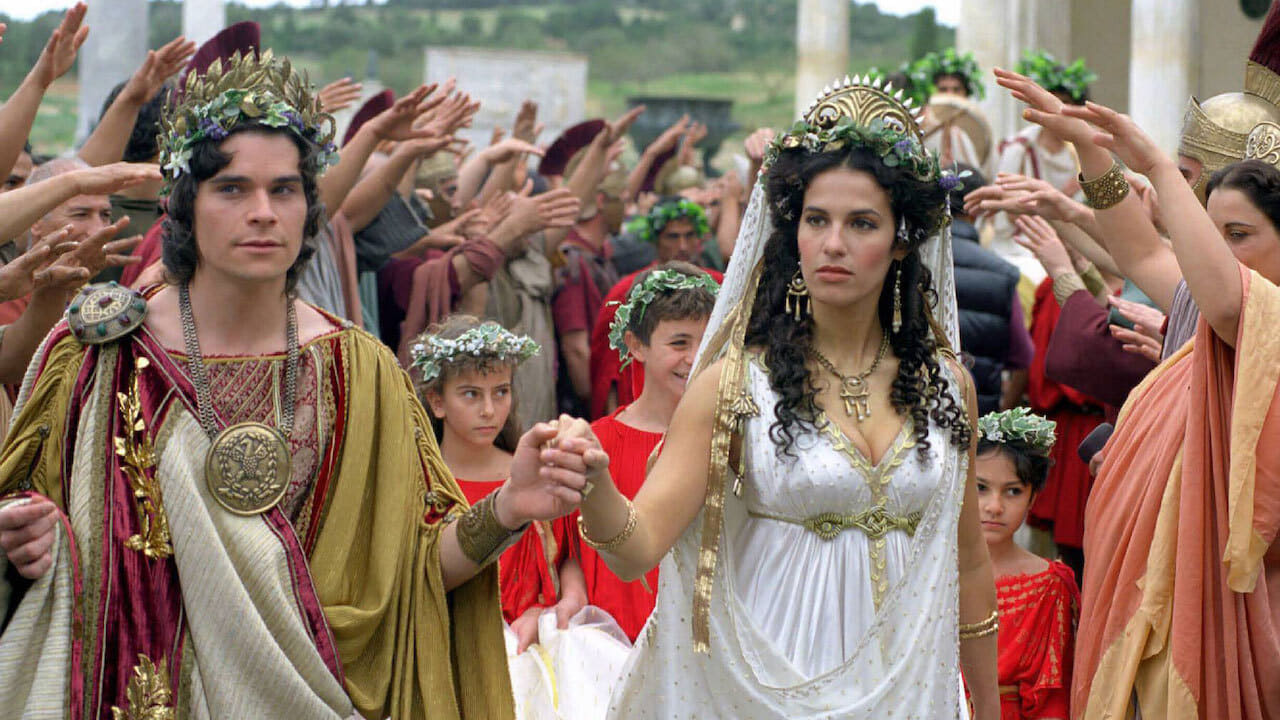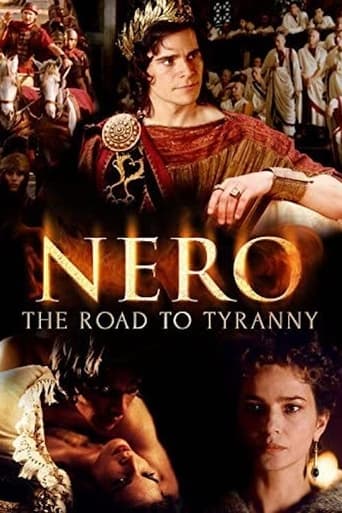

Fantastic!
... View MoreAfter playing with our expectations, this turns out to be a very different sort of film.
... View MoreThe plot isn't so bad, but the pace of storytelling is too slow which makes people bored. Certain moments are so obvious and unnecessary for the main plot. I would've fast-forwarded those moments if it was an online streaming. The ending looks like implying a sequel, not sure if this movie will get one
... View MoreOne of the film's great tricks is that, for a time, you think it will go down a rabbit hole of unrealistic glorification.
... View MoreOne of the greatest things about this obscure and lengthy German/Italian TV video is that it contains none of the over-famous and over-paid Hollywood faces that plague us in the usual video-store fare. Another huge advantage is that, being set in Ancient Rome, it will never feature a hideous American gas-guzzling automobile, neither will characters use a telephone or wear mass-produced off-the-peg clothing. It also eschews those tedious set-pieces with a "cast of thousands" that the Hollywood egomaniacs feel obliged to deliver. Instead, it is a love story between two young people raised in rustic simplicity in a country villa. Their love is interrupted by fate, and the rest is 90 minutes of turmoil as Claudius the healthy peasant boy becomes Nero the tortured idealist who in despair ultimately dies by his own hand.I gather from other comments that the story has little historical accuracy, but neither did Ben Hur nor The Ten Commandments. Hans Matheson as Nero makes a decent job of a difficult role. He transitions from simple country boy to deranged paladin effectively enough considering the complications of episodic scripting and Italian TV boss Berlusconi's feeble brain-power. When Poppea drugged him, I felt sorry: he would obviously never be the same again, and indeed, he did condemn the lover of his youth, Acte (popular German TV actress Rike Schmid), to death as a Christian, but more probably because she was taller than he. This is for fans of films set in Ancient Rome, who do not have PhDs in Roman history. As such it works fine: settle back for three hours of togas and treachery and take no notice of the self-appointed experts.
... View MorePerhaps, we are too much attached to great spectacles when we hear of antiquity brought to screen. Perhaps, we expect too much from these films. However, if we, as viewers, are offered far too little, what happens then? That is what I thought after seeing IMPERIUM - NERONE by Paul Marcus, a part of the production series on the Roman Empire. AUGUSTUS by Roger Young, the first IMPERIUM movie, included at least Peter O'Toole but what does this movie include?Hardly anything accurate. The historical errors are so serious that the movie changes facts and constitutes rather a distorted image of the Roman Empire than the true history. Throughout the movie, we see Nero young: young man during the allegedly long reign of Caligula, young man during the reign of Claudius and finally during his own (historically 14 year long) reign. And...he dies the same. According to the movie, Nero, born during the reign of Tiberius, lives for more than 40 years but looks to be in his late twenties when he dies... Continuity combined with made up history is the biggest problem of the movie, which makes it hardly logical, not to say reliable. Nero loses his father, is raised by slaves. At that time, his mother, Agrippina, is exiled by Caligula. Later, however, she suddenly marries emperor Claudius who already has big children with freshly married to him Messalina. At these moments of the movie, we see Acte (Rike Schmid), Nero's mistress. All right, it is historically "accurate"; yet, no source proves that she played such a decisive role in the rise of Christianity in Rome. In the film, she is not only a devoted Christian but even a witness of St Paul's miracle (he brings a young girl Marzia back to life). Besides, there was, historically, nothing like Nero seen on the court of Caligula since Nero was born in Caligula's 4 year long reign (A.D. 37-41). I understand that movies may change something but such an error makes the script absolutely unreliable! And many, many other shortcomings concerning content that are hard to enumerate but after 30 minutes of watching this film, I doubted whether I was watching a historical movie or a total fantasy.As for its artistic features which supply us with entertainment, they are equally lame as the history here is. The performances are artificial, the cast simply have beautiful faces but weak acting abilities. Perhaps, I am too much attached to Peter Ustinov or Charles Laughton in the lead, but Hans Matheson does not fit as Nero at all. He could have some of the good moments as an actor but never as the infamous Roman emperor. Is he an artist who burns Rome for a song? Is he a cynic who disguises the love to his relatives? Is he a cruel ruler who sacrifices the lives of thousands of innocent people for the sake of "alleged justice"? None of these. He is just a young man who does not know how to rule and, in the long run, begins to release the fire burning within himself... John Simm is out of place in this film as Caligula and absolutely inferior to other portrayals of the character. Elisa Tovati is only sexy as Poppaea; yet she could have been much much better. The costumes are inaccurate and the sets do not amaze. Low budget results in low effects and, consequently, low entertainment.But what made me most angry in this movie and, as a result, I give it 1/10 are some moments that are absolutely unacceptable:the death of Poppaea and St Paul's talk with Nero at her dead body, Claudius' mention of the current conquest of Britannia on the feast and soon his death (he conquered Britannia while Messalina was his wife much before his death), Tigellinus killing Agrippina (Laura Morante), Nero's mother, Nero's arguments in the speech to the senators, finally, Nero's death - a calm day at the lake and an indifferent suicide that leads to a moral said by Acte "Let us forgive him"All in all, this film is a waste of time and is absolutely unneeded as yet another production concerning the Roman Empire. It's better to make one good film in 30 years than ten minor little ones in 5 years. 1/10 - should not have been made at all.
... View More"Nero" as the title of the movie is in Germany is a another attempt to show one of the most interesting Roman emperors, Lucius Domitius Ahenobarbus, better known as Nero. Although this attempt at least tried to show a more historic accurate Nero than the amusing but completely fictitious Nero Peter Ustinov played in "Quo Vadis!" it still is a major failure. And to those IMDb-commentators who still believe that Sueton and Tacitus propaganda is true, please read a book about Nero that was published less than 20 years ago. Nero did NOT burn Rome, this is proved! He did not murder Britannicus. He did not torture, kill and maim for pleasure, he was the first emperor who BANNED the gladiator fights. The movie still shows a lot of mistakes, errors and is by the way made in a really cheap style, especially the sets were cheap and unconvincing, the palace looking like some villa, the city itself looked like..well like a cheap set. The acting was between good and sub-par, the music nearly insignificant and the movie soon deteriorated after Nero became emperor to a rushed, bad edited mess without any clear narrative structure. So there still is the potential for an epic biography of Nero that shows the true Nero, who was one of the best emperors who ruled Rome, despite the lies of Sueton et al.
... View MoreThe miniseries made of television that examines the highlights of the Roman Empire ('Imperium: Augustus' was the first). While the sets and costumes and flavor and atmosphere of that phenomenal period in history is well captured and the production qualities are strong, the historical accuracy is diminished by 'cleaning up' the facts and rearranging dates and incidents to make a 'Hollywood version' of the Roman Empire.Given the fact that this is not a biopic but rather an entertainment, IMPERIUM: NERO is interesting, if long at 192 minutes, to watch in continuity. Nero was born in 37 AD and died in 68 AD and during those 31 years much changed in Rome. We first met Nero as a child 'abolished' to a life with the slaves by the infighting among the Emperors - Caligula (John Simm) and Claudius (Massimo Dapporto) - and the Senate - namely Porridus (Simón Andreu), Burrus (Maurizio Donadoni), and Septimus (Ian Richardson). While living among the people we are informed that Nero (a fine Hans Matheson) falls in love with commoner slave Acte (Rike Schmid) and when misdeeds in Rome call him back to power (through the wily and devious guidance of his mother Agrippina (Laura Morante, the true star of this film), Nero is forced to marry well and forswear his love for Acte. Once proclaimed Emperor, Nero does some bad things such as having his brother Britannicus (Francesco Venditti) killed, etc and begins to descend into madness instead of fulfilling his vision of creating an empire for the people. His teachers include wise Seneca (Matthias Habich) and commoner Etius (Jochen Horst) and his loyal friends include Tegellinus (Mario Opinato). Once on his downward spiral Nero begins to murder and destroy those close to him and finally burns the city of Rome to prepare the ground for his grand palace and city, all the while playing on is lyre.If this all sounds wicked and cruel, then it is probably better that the story didn't 'flesh out' the true obese, schizophrenic, megalomaniacal, sexually dysfunctional creature that was Nero. You need the history books to see what a hideous tyrant he was, a man who placed his acting and circus skills above all else, castrating young boys who resembled his mother to marry while also marrying the prostitute Poppea (Elisa Tovati). But the major problem with this version of Nero's tenure is the emphasis on the new sect called Christians. Indeed, even the apostle Paul is brought in to cleanse the proceedings and seep evangelicalism into the story to help it end! But for the script as written (by Paul Billing and Francesco Contaldo) director Paul Marcus brings off a fascinating though long image of the Roman Empire. Not for Roman scholars perhaps, but for those who enjoy historically based epics, this NERO should do nicely Grady Harp
... View More